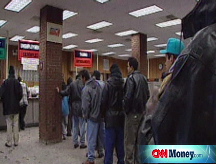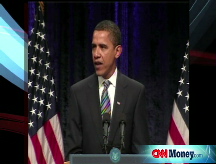Dollar mixed on job news
Greenback gains against euro, falls versus yen, little changed against pound as investors mull U.S. job losses.
NEW YORK (CNNMoney.com) -- The dollar was mixed against major currencies Friday, as investors took the news of the high number of U.S. December job losses in stride.
The greenback was boosted on the slightly better-than-expected news of 524,0000 jobs lost in December, according to John Kicklighter, a currency strategist with DailyFX. That's because some speculators may have been expecting a higher figure, as was the case in November when job losses exceeded many forecasts, he said.
The lower than expected losses sparked a slight dollar rally, but the movement was due "more on relief and repositioning than any belief that the worst is behind [us]," according to a research note from Sacha Tihanyi, currency strategist at Scotia Capital.
The Labor Department also reported that the unemployment rate rose to 7.2% last month from 6.7% in November - its highest rate since January 1993.
The pound had been gaining against the dollar for five consecutive days, but was largely unchanged late Friday, ended slightly lower against the dollar.
The British pound fell 0.25% against the dollar to $1.5178 from $1.5197 late Thursday.
The Bank of England lowered its key interest rate by half a percentage point to 1.5% on Thursday, an historic low. That caused the pound to surge, as many investors were expecting a larger cut, up to three-quarters of a point, according to Tom Benfer, director of foreign exchange at BMO Capital Markets. That surprise likely caused many speculators who had shorted the pound to buy it back to cover their positions, causing it to rise, Benfer said.
The greenback dropped 0.95% against the Japanese yen, purchasing ¥90.32, down from ¥91.28 late Thursday.
Kicklighter cited the bleak jobs report as one reason why investors prefer investing in yen to dollars.
"The yen is perceived as a less risky investment than the dollar, and with so many jobs lost, the yen will continue to appreciate against the dollar," Kicklighter said.
According to analysts, the yen's recent strength comes from investors borrowing the currency over the past 10 years in order to buy assets - often in the United States - that provided a higher return.
As those assets, which include real estate, have fallen in value, investors have had to pay back the money to Japan. That has been driving the dollar lower versus the yen.
The 15-nation euro fell 1.90% against the dollar, trading at $1.3442 from $1.3726 late Thursday.
Kicklighter attributed the euro's gains to the fact that investors are evaluating where they can expect to find the greatest return, and they may be finding that in European investments, as opposed to American investments.
"Investors aren't as nervous as they were in October. They are looking for returns on capital rather than trying to preserve capital. In the euro zone, people are more optimistic about growth," Kicklighter said.
The European Central Bank is widely expected to cut its key interest rate at its Jan. 15 meeting.
Outlook: Kicklighter said he thinks investors will be less likely to stash their cash in Treasurys in an effort to preserve capital, and will begin to seek investments that offer returns.
Investors must buy dollars to get into Treasurys, and if investors sell their dollar-denominated Treasurys, that could weaken the greenback against major currencies.
"Investors are looking for which economy is going to recover first, and they will be looking more at economic fundamentals from here on out," Kicklighter said. ![]()



